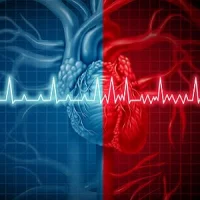In a small cross-sectional study, regular alcohol intake at moderate levels was found to be associated with electrical and structural changes in atrial myocardium. The study is published in Heart Rhythm.
The study included 75 healthy patients with paroxysmal or persistent atrial fibrillation. Of the 75 participants, 25 were lifelong non-drinkers, 25 consumed two to seven drinks per week and 25 consumed eight to 21 drinks per week. Patients with permanent AF or structural heart disease as well as occasional and binge drinkers were not included in this study.
Moderate consumption, for the purpose of this study, is defined as eight to 21 drinks per week. One drink, again for the purpose of this study, contained approximately 12g of alcohol.
It was observed that moderate drinkers had significantly lower mean global bipolar voltages, slower conduction velocities and a higher proportion of complex atrial potentials as compared to non-drinkers. Mild drinkers only demonstrated a larger potential of complex atrial potentials but no increase in mean global voltage or conduction velocities.
Moderate consumption of alcohol was thus found to be an independent predictor of atrial remodelling. The same effect was not observed among mild drinkers (defined as those who consume two to seven drinks per week).
While this association can't be proven to cause atrial fibrillation, it is clear that moderate alcohol intake has a direct effect on the atrial substrate. These findings also confirm previous evidence that excessive alcohol consumption is a modifiable risk factor for AF. Hence, in order to improve AF outcomes postablation, emphasis should be placed on recommending lifestyle modification in people who are moderate consumers of alcohol.
Source: Heart Rhythm
Image Credit: iStock
References:
Voskoboinik, A et al. (2019) Moderate alcohol consumption is associated with atrial electrical and structural changes: Insights from high-density left atrial electroanatomic mapping. Heart Rhythm. doi.org/10.1016/j.hrthm.2018.10.041
Latest Articles
atrial fibrillation, alcohol consumption, left atrial dilation
Regular alcohol intake is an important modifiable risk factor associated with atrial fibrillation (AF) and left atrial (LA) dilation.










